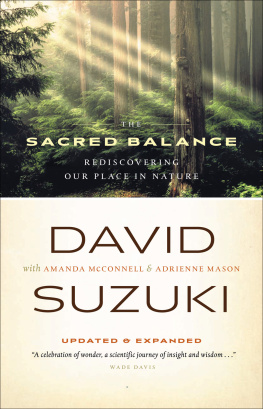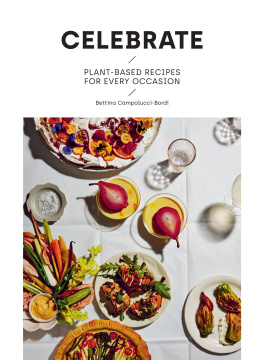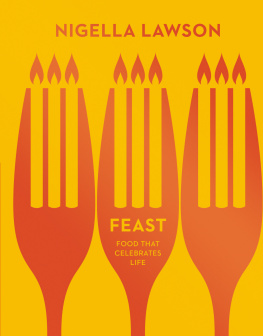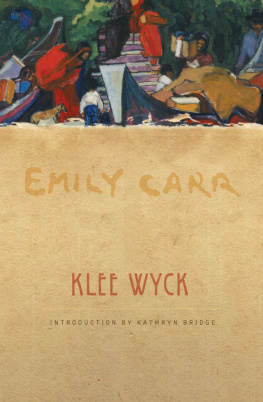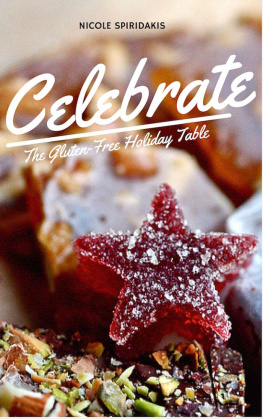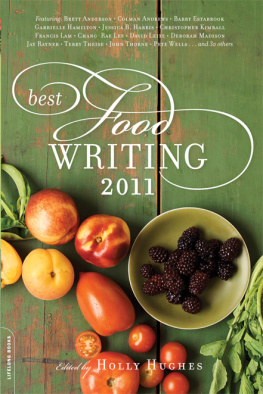
D&M Publishers is marking 40 years of quality independent publishing in 2011. To celebrate, weve created this ebook sampler, with excerpts from some of the best books weve published in four decades.

For more information about our books and publishing history, visit www.dmpibooks.com.
Sophie excerpted from Klee Wyck by Emily Carr
2003 by Douglas & McIntyre, published by Douglas & McIntyre
Jung-Sum, Second Brother excerpted from The Jade Peony 1995
by Wayson Choy, published by Douglas & McIntyre
Goose Food excerpted from A Story as Sharp as a Knife
1999, 2011 by Robert Bringhurst, published by Douglas & McIntyre
The Wonder of the Ethnosphere excerpted from Light at the Edge of the World
2001, 2007 by Wade Davis, published by Douglas & McIntyre
Are These New Canadian Painters Crazy? excerpted from Defiant Spirits
2010 by Ross King, published by Douglas & McIntyre
Homo Sapiens: Born of the Earth excerpted from The Sacred Balance
1997, 2002, 2007 by David Suzuki, published by Greystone Books
Chapter 1 excerpted from What the Psychic Told the Pilgrim
2007 by Jane Christmas, published by Greystone Books
Declaration of a Political Emergency, It Aint Oil, and The Ponds
excerpted from Tar Sands 2010 by Andrew Nikiforuk, published by Greystone Books
Only in Canada and Riding in Boats with Women excerpted from Lakeland
2011 by Allan Casey, published by Greystone Books
Grey Hour, the Bird God and Taking Stock excerpted from Trauma Farm
2011 by Brian Brett, published by Greystone Books
FROM
In the quotations from Native American texts :
[] square brackets mark editorial restorations
angle brackets mark editorial insertions
{} curly braces mark editorial deletions
daggers flag passages that seem corrupt

Ghandl of the Qayahl Llaanas of Qaysun, or Walter McGregor, the blind poet of Sunshine and Sealion Town, spent the month of November 1900 telling stories that is to say, dictating his condensed, tightly woven narrative poetry to a 27-year-old linguist from the state of Maine. The linguist was John Reed Swanton (18731958), a self-effacing man who spent a year in Haida Gwaii and years more making sense of what he learned while he was there. He became, by what we might call accident, a figure of considerable importance in Haida cultural history.
A third important person joined Ghandl and Swanton at each session: a young bilingual Haida whose Christian name was Henry Moody (c. 18711945). He was Swantons tutor, assistant and guide, and during these long sessions of dictation typically six hours a day he was the storytellers primary audience and the linguists second tongue and set of ears. His task was to listen to the poem and repeat it sentence by sentence in a loud, clear, slow voice, proving to the poet he had heard each word and giving Swanton time to write it down. 7 Ghandl spoke, a sentence or two at a time, Moody repeated, and Swanton wrote, hour after hour, day after day. On one of those wet November days, Ghandl began a poem with the following words:
Ll gidaagang wansuuga.
Kkuxu gyaaat gutgu lla giistingdyas.
Ll xhitiit ttsinhlghwaanggwang qawdi
llanagaay diitsi qahlagaagang wansuuga.
Ttsalaay waghii gwatxhaawasi
suughii lla qaagyaganggandi xhan
ll gyuugha hlgitghun kyingaangas.
Gyaanhaw gha la qaagasi.
Ga jaada sting suugha ghaadangdyas.
Tlaagi giina sqqagidaasi gu
hlgitghun qqaal ttlsting xhaxiiwas.
Kkit qqul ghaada qqaghattiisgasi.
Lla qindi qawdihaw
lla dawghattlxhasi....8
T HERE WAS a child of good family, they say.
He wore two marten-skin blankets.
After he took up the shooting of birds,
he went inland, uphill from the village, they say.
Going through the pines,
just to where the ponds lay,
he heard geese calling.
Then he went in that direction.
There were two women bathing in a lake.
Something lay there on the shore.
Two goose skins were thrown over it.
Under their tails were patches of white.
After watching for a while,
he swooped in.
He sat on the two skins.
The women asked to have them back.
He asked the better-looking one to marry him.
The other one replied.
Dont marry my younger sister.
I am smarter. Marry me.
No. I will marry your younger sister.
And she said that she accepted him, they say.
Well then ! Marry my younger sister.
You caught us bathing in a lake
that belongs to our father.
Now give me my skin.
He gave it back.
She slipped it on
while she was swimming in the lake.
A goose swam in the lake then,
and then she started calling,
and then she flew, they say,
though leaving her younger sister
sickened her heart.
She circled above them.
Then she flew off, they say.
She passed through the sky.
He gave the younger woman one of his marten-skin blankets,
and he brought her home, they say.
A two-headed redcedar stood at the edge of the village,
and he put his wifes skin between the trunks.
Then he brought her into his fathers house.
T HE HEADMANS SON had taken a wife.
So his father invited the people, they say.
They offered her food.
She did nothing but smell it.
She ate no human food at all.
Later, her husbands mother
started steaming silverweed,9they say.
Then she paid closer attention.
When her husbands mother was still busy cooking,
she asked her husband
to ask her to hurry, they say.
They placed it before her.
It vanished.
And then they began to feed her this only, they say.
After a time, as he was sleeping,
his wife lay down beside him,
and her skin was cold.
When it happened again,
he decided to watch her, they say.
He lay still in the bed,
and he felt her moving away from him slowly, they say.
Then she went out.
He followed behind her.
She walked along the beach in front of the village.
She went where the skin was kept.
From there, she flew.
She landed beyond the point at the edge of town.
He started toward her.
She was eating the eelgrass10that grew there,
and the breaking waves were lifting her back toward shore.
He saw her, they say.
And then she flew back where they kept her skin.
He got back to the house
before she did, they say.
There he lay down,
and soon his wife lay down beside him, cold.
A famine began in the village, they say.
One day, without leaving her seat, she said,
My father is sending things down through the clouds to me.
Back of the village, geese began landing and honking.
She went there.
They followed her.
Food of many kinds was lying there:
silverweed and clover roots.
They carried it home.
And her father-in-law invited the people, they say.
When that was entirely gone,
she said it again :
My father is sending things down through the clouds to me.
Geese began landing and honking again in back of the village.
They went there.
There were piles, again, of many kinds of food.
Next page
